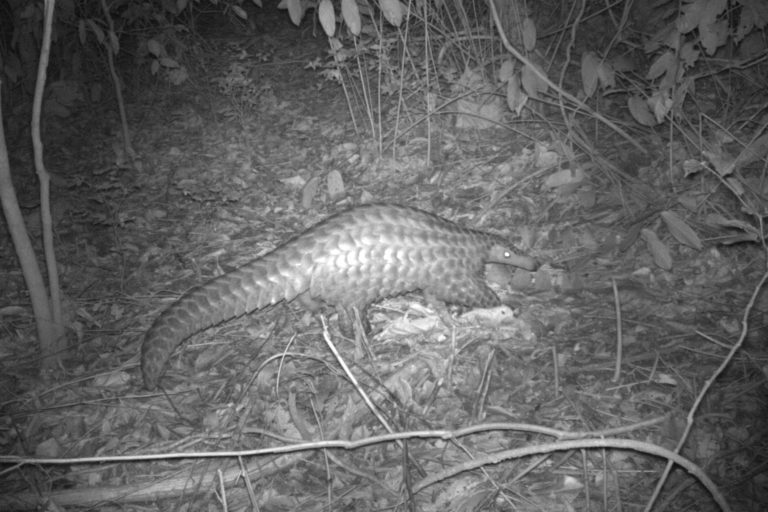Researchers have confirmed seven cases of pangolin trafficking in South Sudan, with much higher numbers likely.High demand for pangolin scales and meat in Asian markets has brought pangolin species in Asia — and now in Africa as well — to the brink of extinction.Stronger wildlife monitoring and trafficking enforcement are essential in an African country filled with invaluable species and political conflict
See All Key Ideas
Illegal poaching and trade of the world’s most trafficked mammal — the pangolin — has been confirmed in South Sudan. Wildlife officials intercepted seven cases of this animal or its parts being transported for sale, researchers reported recently in the African Journal of Ecology.
The devastating trade in pangolins was well known in Asia, but this incursion into Africa is a disturbing new threat to a species that captivates the public with its scaled body and gentle nature. “For the first time, we have been able to show that trafficking of pangolins is occurring in and through South Sudan,” said Daniel Ingram, a wildlife conservationist at University College London and lead author on the study.
Wildlife Conservation Society Country Director, Albert Schenk, with three confiscated live pangolins (two adults and one juvenile), possibly Smutsia temminckii. Credit: WCS South Sudan
A land-locked nation in Eastern Africa, South Sudan gained independence in 2011. Within two years, intense conflicts and civil war erupted, creating a highly unstable environment for the country’s human and animal residents alike.
From savannas to wetlands and high-altitude plateaus to mountains, South Sudan is brimming with biodiversity. The world’s second largest migration, involving hundreds of thousands of white-eared kob antelopes, takes place in one of the country’s six national parks. Eight endangered or critically endangered mammals reside here, including three of the four African pangolin species: the giant pangolin (Smutsia gigantea), the white-bellied pangolin (Phataginus tricuspis) and Temminck’s ground pangolin (Smutsia temminckii).
Considered vulnerable on the IUCN Red List of Threatened Species, pangolins have technically been under legal protection since 2007. Although pangolin seizures were reported in surrounding African countries earlier this decade, researchers had yet to confirm whether pangolin hunting or trade was occurring in South Sudan until now. “It took us several months to track down all of the relevant information,” said Ingram.
Ingram and three colleagues from wildlife societies in South Sudan combed through five years’ worth of seizure records from local law enforcement agencies. They documented seven cases of illegal possession at road checkpoints, a national park, an airport, and a hotel. Three seizures were of pangolin meat, two of the animal’s scales, and two of live animals being trafficked through the capital city, Juba. The team believes many more undetected cases of commercial pangolin trafficking are likely.
Black-market demand for pangolin scales and meat has soared, fueled largely by consumers in China. Buyers believe pangolin scales bring luck and protection against witchcraft. The meat is also considered a delicacy, and some cultures use the blood of pangolins to treat ailments.
“South Sudan only recently became connected with international markets,” said DeeAnn Reeder, an ecophysiologist at Bucknell University in Lewisburg, Pennsylvania, and research scientist in South Sudan, who was not involved in the study. Publishing proof of seizures, she said, is a good step toward “getting South Sudan on a pangolin watch list.”
The world’s four other species of pangolin are native to Asian countries such as India, China, Indonesia, and the Philippines. All of these are endangered or critically endangered. With Asiatic populations dwindling, the insatiable demand for pangolin meat and scales has ignited the illegal pangolin trade in Africa.
Covered in pine-cone-shaped keratin scales strong enough to withstand a lion’s grip, a pangolin defends itself by curling into a ball, protecting its head and abdomen. Unfortunately for the scaly creature, this reflexive posture makes capturing a pangolin all the easier for a human predator.
Despite their popularity, there is much scientists do not yet know about the lives of these nocturnal, solitary animals. “It is extremely difficult to observe pangolins — they are very elusive and enigmatic creatures,” said Albert Schenk, Country Director with South Sudan’s Wildlife Conservation Society and co-author of the paper.
The extended civil conflict in South Sudan has severely limited the resources of local law enforcement to regulate and monitor the illegal wildlife trade. Prosecuting offenders is rare. “Until there’s stability, people can’t be held accountable,” said Reeder. “The best thing for pangolins right now is peace.”
Citation: Ingram DJ, Awol PP, Ding KA, Schenk A. First records of pangolin trafficking in South Sudan. Afr J Ecol. 2019. https://doi.org/10.1111/aje.12678
Ashleigh Papp (@heysmartash) is a graduate student in the Science Communication Program at the University of California, Santa Cruz. Other Mongabay stories produced by UCSC students can be found here (https://news.mongabay.com/list/ucsc/).
Source link : https://news.mongabay.com/2019/11/pangolins-are-a-victim-of-political-instability-in-south-sudan/
Author :
Publish date : 2019-11-21 08:00:00
Copyright for syndicated content belongs to the linked Source.
